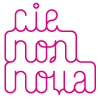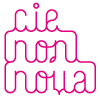The Trilogy of Immoral Tales (for Europe)
I.C.E.The Trilogy of Immoral Tales (for Europe)
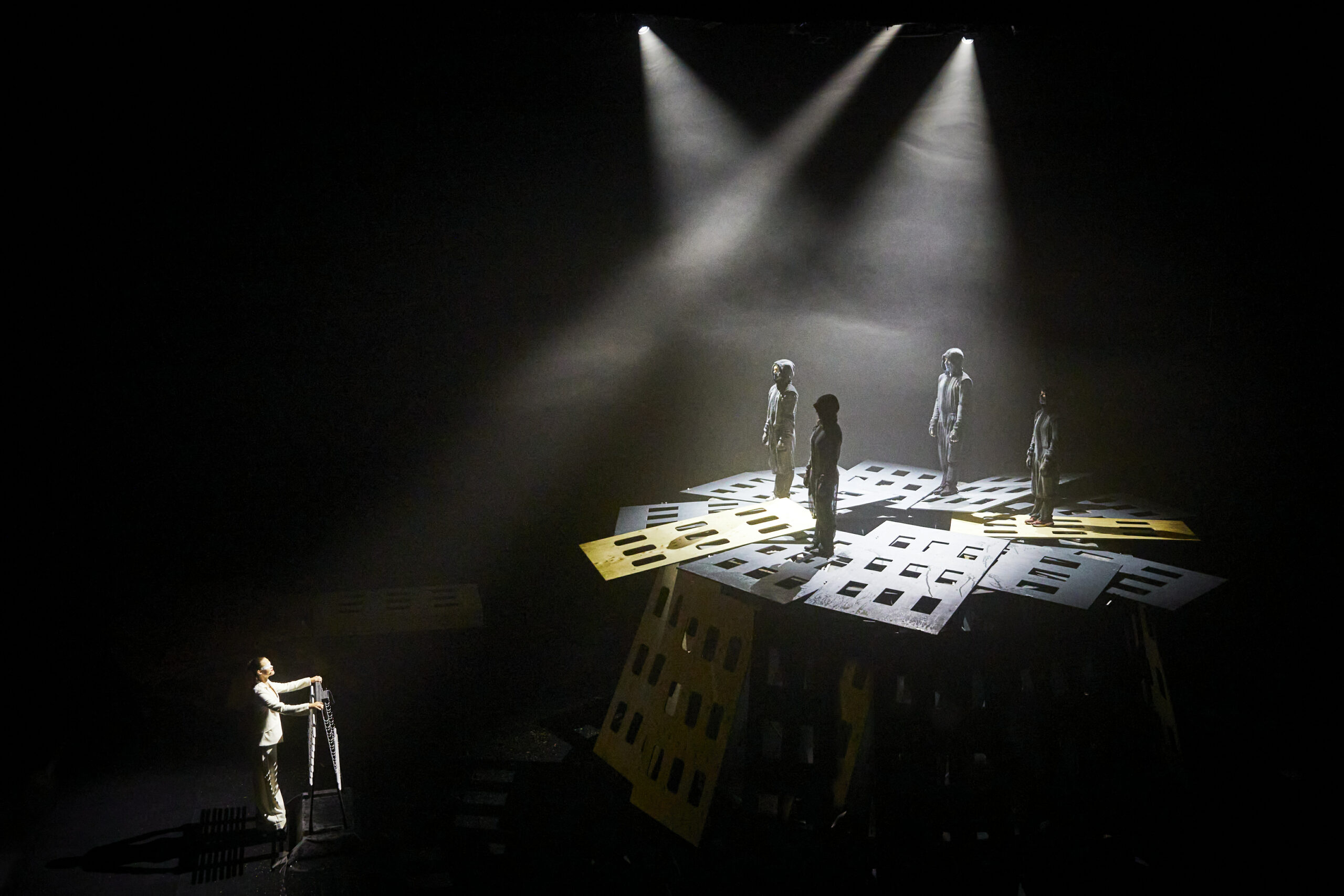
“I don’t know how to forget.
The desire to think more profoundly is a question of absolute necessity for all artists.
I am not a specialist in geopolitics, just an observer of the world through my practical experience. The tours and residencies I have been on, my encounters with people and my desire for immersion have all aroused my appetite for discovering societies, myths, customs, identities, bodies. I don’t feel I possess any particular knowledge, I am simply looking to understand what drives me to dwell on certain subjects and to go back to them over and over again. During this personal journey and our journey as a team, sometimes events transform our trajectory.”
I wrote this note in December 2019, a time which today seems like it was from another tale, from another world. A time we can unquestionably name “The World Before”.
2020 marks a new phase for Humanity.
We can choose to imagine we’re at the dusk of an anthropocene(1) or at the dawn of a new era. No one, apart from the most vigilant of our scientists, saw the rupture coming.
No matter where nor how the virus originated, it would not be presumptuous to imagine that other viruses will come and rob us of our freedom.
Yes, it will be difficult for us to forget the ecstasy of our innocence during these past decades.
Difficult to anticipate a world where encounters, sharing and touch are conditioned by new social interactions and gestures, new rules and new responsibilities which terrify us.
As I write, our right to Art and Culture in French society has still not yet been granted. The theaters, the cinemas, the museums, the librairies, the restaurants, the cafes, the places to meet and share and exchange with others are closed, forbidden to the general public. These political decisions are not just about health risks. (Public transport, shops, factories and even places of worship are allowed to remain open, all deemed “necessary”?)
Faced with all this consumerism and bargaining, the fact that we have to fight for Art and Culture in our society, shouting out how vital it is for everyone, for humanity, for education, for our mental health, shows us to what point the struggle against necropolitics(2) is part of our future and part of class conflict.
In order to keep creating art we need to refute those who say the shows performed in our theaters are too elitist. There is nothing wrong with wanting an elitism for the majority, nor with demanding quality and freedom of thought for everyone. This is not demagogic nor subversive – it’s rational and reasonable. Educating an entire population is not about selling tickets and events, or getting “likes” and “followers”, it’s about provoking questions, reflection and discussion, which comes at a cost. Humanitarian and societal crises which shake us to the core can’t be treated at Les Galeries Lafayette (nor Selfridges, nor Macy’s) nor on platforms like YouTube and YouPorn!
Year One of this new era must startle us out of our stupor. Regardless of the financial administrators who govern us, it’s up to us to invent forms, gestures, dances and new rituals, to get back in touch with ourselves, to rid ourselves of this self-alienation brought about by our consensual relationship with material goods, and instead reaffirm community, humanity, alterity.
We have been starved of community for months now. We miss it. Democracy can happen if we stop trying to save our own skin and instead start thinking in terms of community.
At the Compagnie Non Nova – Phia Ménard, our research into the transformation of matter and the elements in the framework of the project I.C.E. (“Injonglabilité Complémentaire des Eléments” – “Complementary Unjugglability of the Elements”) resonates even more since the beginning of this pandemic. Our theatrical, choreographic research methods where dramaturgy is prioritised over beauty, time is prioritised over “doing what is easiest”, and human beings are prioritised over technology, are all now unquestionably necessary.
Our shows require long periods of research. We work with matter and elements which are often uncontrollable. We work with maximum safety and a reasonable amount of technical support. We don’t use special effects. Our projects are financed with money from our own coffers, from ticket sales and from the public purse. Each new adventure is a risk which implies uncompromising, uncensored professionalism. Working as a team means dealing with alterity; it’s a learning process in terms of respect, consent and the demands of each and every member of the group, be they artists, technicians or administrators.
For you, our producers and your teams, those of you who support and finance our projects, I know the difficulties involved in defining our work, in communicating what we do to your audiences and in selling our shows. Today, maybe more so than in the world Before, let us trust our audiences, let us trust their capacity to question the imaginary world and their ability to endure adversity, as it has now become a shared experience.
The Genesis …
In 2016, much to our surprise, we received an invitation from la documenta.
We were commissioned to create a performance piece of art or an exhibition for documenta 14, the 14th edition of the quinquennial contemporary art exhibition in Kassel (Germany), under the direction of Adam Szymczyk and Paul B. Preciado.
The two themes for this edition were: « Learning from Athens » and « Parliament of Bodies ».
Having visited Kassel and Athens, I chose to work on Athens. Is it the birthplace of a mythologised Europe, and is Kassel the birthplace of a monstrous Europe?
For we Europeans, the Republic of Athens is a cradle of myths, its history has been studied as much as it has been romanticised, it is the birthplace of philosophy and of theatre.
Kassel could pride itself on being the hometown of the Brothers Grimm, but like so many towns in Germany, its dirty history of Nazi involvement from 1933 to 1945 has stained the city. The town was left in ruins in the middle of devastated post-war Europe, and it was here that a project to rebuild and heal the population through art and education was introduced: “la documenta”. It plays a major role in preventing and nursing the possible relapse of this infection. This re-education project inspired me to imagine a series of performance pieces in the form of fairytales which I call “The Trilogy of Immoral Tales (for Europe)”, telling the story of the construction and deconstruction of a city: Europe.
« Part 1: Mother House »: The Era of the Gods. The tale of the goddess building the first house of Humanity. A laborious, fastidious task, so easily destroyed.
« Part 2: Father Temple »: The Era of Power. The tale of the tower of cards, a sadomasochistic ritual.
« Part 3: The Forbidden Encounter »: The Era of the Invisible People. The tale invites us in.
In July 2017, we completed Part One of our trilogy, Mother House. Because of the documenta’s budgetary limits for the festival’s shows and exhibitions, the two other fairytales were put on hold.
2020 …
I couldn’t have imagined that a performance piece, dreamt up in my mind, might one day be caught up by reality.
“Maison Mère” or “Mother House”, the first part of “Immoral Tales (for Europe)”, created in 2017, was a test show, a trial run about a world built slowly and laboriously and which then collapses at the mercy of uncontrollable elements. This pandemic has shifted our performance from the sphere of phantasmagorical to metaphorical. I would like to write “the” instead of “this” pandemic, as if hoping it was a one-off experience, a drama in the past. But no, we now know that this is here to stay, we have to learn to live with it, whether we like it or not.
As I reread the theme “Apprendre Athènes” (“Learning from Athens”), I realise we all need to understand that we simply cannot mess about with this planet we all share. Nature is teaching us a thing or two about humility by bringing us crashing back down to ground. Athens was devastated by the plague a long time ago; like Athens, we thought we would escape this fate.
And yet, once we have recovered from the initial shock, it’s obvious that we haven’t yet learned to draw any conclusions…
Once I had got over the shock and had started to ask myself what is important to me, I realised that the core of “The Trilogy of Immoral Tales (for Europe)” lies in this crushing situation we are currently struggling through.
Getting back to creative work is my way of leaving the fear and dread behind: physically devising performance pieces is the basis for accommodating alterity and the desire to forge fresh rituals.
Here you will find an attempt to think differently, a thought process born in a world which did not see the crash that was coming, despite its acceleration, and which now continues towards an uncertain future. From “Maison Mère” (“Mother House”) through “Temple Père” (“Father Temple”) to “La Rencontre Interdite” (“Forbidden Encounter”), here is a series of three fairytales made up of rituals and architecture. Lonely, forsaken bodies, battles without victory, games in environments that, at first hand, seem safe and free of danger …
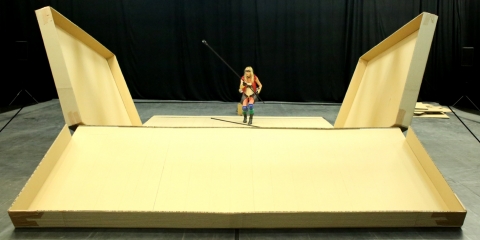
Immoral Tales – Part 1: Maison Mère/Mother House
No future, fuck off power! Fuck off patriarchy!
That’s how it all started. The 80’s, Margaret Thatcher, Ronald Reagan and the theories of the Chicago boys, the defenders of the motto « There is no alternative »(3) for a free-wheeling form of neoliberalism without bounds. I remember the miner’s strikes in England, carried along by the coarse sounds of the Sex Pistols. The punks with their multi-coloured mohawks, refusing to be a part of this world “without a future”. Decades have gone by and I can’t stop thinking that they were visionaries: we live in an unfair world, the majority barely earning a living, whilst a handful of individuals take advantage of the situation and rack up billions.
It’s right before our eyes, the unbearable poverty sitting in the midst of sumptuous wealth. You see it on the corner of the street, or in the narrow passages between two roads; one day a makeshift shelter pops up, built of planks, plastic and cardboard boxes. The “houses” belonging to survivors of a system which denies them the right to live with dignity. They are everywhere: in Paris, Berlin, London and Athens, the forgotten ones, left behind after the last drops of the trickle-down financial mirage dried up.
I was in Athens in 2016, when the leaders of Northern Europe decided to put Greece under economic and administrative supervision for a doxa: budgetary balance! And so the European construction turned into a human disaster for the people of Greece. I saw scrawny migrants welcomed by already impoverished Greek families. I saw the poverty pushed away and hidden elsewhere by the police, whilst a few streets away hordes of exuberant European tourists paraded through the bustling district of the Acropolis.
I dreamt up this cardboard “House” (a “Cardenon”), an exact replica of the magnificent ancient Greek Parthenon in Athens, precisely 1/10th of its size. A flat-pack house, to be put-together like Ikea furniture for children. A game, a house, a shed, a shack for adults. A giant sheet of cardboard covers the entire stage. A figure sits upstage, emotionless, impassive, a blend of warrior and punk, watching. The procedure begins. Methodical, meticulous, rip, fold, lift, balance; slowly a symbolic form takes form: a house.
The Mother House is the laborious, dangerous birth of the city, a tale of human ordeal, powerless against the elements.
I want to listen to the ruins.This means summoning a goddess, summoning oracles, fighting for an unknown outcome, preferring the marble’s peaceful lustre over the crunching of cardboard. I want to build Europe’s first house. I am a punk Athena, a warrior woman…
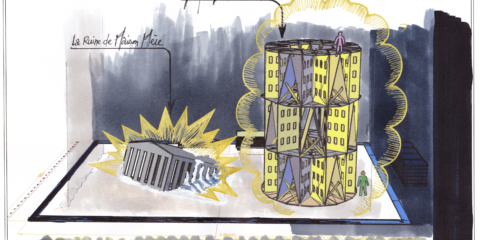
Immoral Tales – Part 2: Temple Père/Father Temple
The two key words for the second part of Immoral Tales are: submission and domination.
These two words get us questioning our actions and our passivity in a system we have built and accepted, an alienation which part of us consents to. Patriarchy is a construction, a system which subjugates the female body and the child’s body to the power of the man, the husband, the father. Patriarchal power is defined by binary conviction(s), Woman as opposed to Man, good in relation to bad, Strong, weak…
The extreme form of economic liberalism known as “ultra-liberalism” and the patriarchal system go hand in hand, both advocating competitive, exploitative systems between human beings, based on violence and on disengaging collective systems, only to replace them with private ones. It’s an enslavement mechanism, the result of which is that today, the richest people in the world represent 1% of the entire population, yet they possess 44% of the world’s private wealth(4).
I associate the two, patriarchy and ultra-liberalism, as if they were one and the same: right now our lives are intertwined with this pandemic, the consequence of human destruction of nature, of excessive mass consumerism, of rising inequality, of the arms race, of the poverty explosion, of migration. This uninhibited liberalism, now decades-old, is pure necropolitics, based on a form of domination built upon the foundations of patriarchy: private property, the exploitation of human bodies, the division of work into domestic and non-domestic, unpaid work which ignores “the private sphere”, pyramidal organisation, hierarchy, dependence, reproduction, violent abuse of women, children, the old and the handicapped; evils we are conscious of, and aware of the consequences they entail(5).
European society has inherited a shameful past, a history of slavery and the plundering of property and possessions. White Europe, rich, seller of beautiful virtues, coloniser, destroyer of entire populations in Africa, Asia and the Americas… she is no longer the White Europe of the 15th to the 20th century, but the aftershocks can still be felt.
No, from here I can still see the agony of current-day slavery in our districts, our towns, our society.
The chains which were once visible have been replaced by new shackles: exploitation, dispossession, despoliation, the draining of hope, a whole new language to describe age-old evils: the trafficking of human beings for the profit of the patriarchs.
The months of early lockdown showed us this: our society didn’t stop functioning even during the severe lockdown in the spring. Thousands of men and women were exposed to the risks of contamination so that others could continue living their protected lives. Shop cashiers, Amazon warehouse workers, garbage collectors, nurses and carers, they all kept going, allowing us to keep eating, keep getting medical help, keeping our streets and cities clean. So many lives working out of devotion or submission – working for us, the dominant ones, relieved of risk and labour. By bringing things to a halt, this pandemic has suddenly thrown into sharp focus the workers who never stop working, the people we forget to notice.
As I look at our society, no matter where I gaze my eye stumbles upon scenes of Humiliation. Pain is everywhere, guilt is the norm. There is so much suffering and repression that I feel compelled to question this partnership between domination and submission.
I search for answers in literature; not didactic, academic forms of writing, but essays related to the representation of submission and domination, like in the ceremonies of sadomasochism where each participant plays a precise role. I search for transgression in the literature of Jeanne de Berg (Catherine Robbe Grillet)(6), Pauline Rage (Dominique Aury)(7), and Sacher-Masoch(8).
Coded rituals and a code of behaviour where specific roles are defined through mutual consent: a contract between individuals, between “tops” (dominants) and “bottoms” (submissives). In this contract we can distinguish the stages which form the constitution of our social groups: the imposition of constraint on an individual, the internalisation of this constraint, and finally the transformation of this constraint into a source of satisfaction. Gilles Deleuze (9) wrote: “ There is no doubt that masochism cannot do without a contract, or a quasi-contract, either actual or in the mind of the masochist, as a prelude to a BDSM relationship.(10) Whether it is a tacit, spoken or written agreement, the contract is vital as it is through this the partners set the terms and conditions of their relationship. It is also an important part of the ritual… The masochistic contract generates a type of law which leads straight into ritual.”(11)
In the context of our performance piece, the contract is signed between performers/slaves and the director/dominatrix, as a piece of staged theatre where the bodies have to silently build the tower, accepting the fact their physical role represents a figure in our society. Through this contract I also want to question the place of the spectator: who do I dominate and/or who dominates me?
The “Father Temple” sequence is therefore a symbolic erection of a seemingly interminable phallic tower: it extends beyond the framework of the theatre space, suggesting it keeps rising higher and higher. The edifice is made of concrete-coloured wooden panels balanced on top of one and other, forming a fragile, yet danger-free architectural structure.
I have chosen the architectural figure of the tower as a sort of multiple reflection of patriarchal power: a demonstration of “dicks” (the race between petrol moguls to build the biggest, tallest tower), and also the belief that algorithms and science will provide answers to the destructive mess we have made, rather than humbly questioning what we are doing to the planet and instead aiming for economic degrowth.
The beauty of the tower also fascinates me, the beauty of the slaves’ labour and no doubt their alienation faced with the final result of their efforts; work which has destroyed their vital energy, but of which they are so proud!
The synopsis: a choreography where everything is ritualised. Pick up a plank, carry it, place it the right way up, fasten a clamp. A simple construction, nothing exceptional, except for the rigour and precision of the slaves who build in silence, without any signs of rebellion. Each storey of the tower carries its own risks. The dominatrix surveys, directs, corrects the mistakes. Each and every situation could be a catalyst for humiliation.
There are 5 slaves: a child who works despite her age, an injured man who works despite his wounds, a pregnant woman who works even though she is carrying a baby, a person of undefined gender and origins forced to work, and a blind man who works despite his handicap. These are the exploited ones.
The pleasure in enslavement is disturbing … How many edifices have been built through the toil and deaths of slaves, with their unquestioning pride in their submission, in order to demonstrate the power of one dominant individual?
Immoral Tales – Part 3: La Rencontre Interdite/The Forbidden Encounter
The year 2020 signalled the end of innocence for all of humanity and an analysis of our situation: globalisation is uncontrollable and this virus has shown us so. From Wuhan to our own bodies, there are no more guardrails, no crash barriers.
On the 4th of August 2020, in the port of Beirut, a large amount of ammonium nitrate stored in hangar number 12, exploded, destroying a huge chunk of the Lebanese capital, causing 205 deaths and injuring thousands more. The words of Rasha Salti (12) ring in our ears: “ We, the citizens hit by the explosion, we are no more than collateral damage in the quest for power by the directors of globalised businesses, multinational banks, diplomats, governors and elected representatives.”
The Rana Plaza collapse(13) in 2013, a gigantic “fast fashion”(14) garment factory collapse: 1135 killed, “collateral damage”. The Sampoong Department Store collapse(15) in Seoul in 1995: 502 killed, “collateral damage”.
We sit and watch the news hit our tablets and phones so fast we don’t have time to reflect upon it. The files and articles come in non-stop, back-to-back, the hanging bodies pass by like corpses in a slaughterhouse. How much more “collateral damage” is yet to come?
I question the concept of “collateral damage” and our acceptance of it, the way it distances us from our humanity and drags us towards barbaric inhumanity. This makes me think of the essay by the philosopher Michel Henry(16) who wrote about how barbarism scoops us up and carries us along with it: “The unprecedented development of scientific knowledge goes hand in hand with the collapse of other activities (other forms of culture such as art, ethics and religion) and brings about humankind’s downfall.” As he explains, science is a form of culture in which life denies itself and refuses itself any value. It is a practical negation of life. He defines the essence of life as “making the effort to better oneself and fulfill oneself”. Barbarism is the reversal of this process because it results in the blind progression of the mathematical technique of algorithms (17), generally considered to be positive and rational.
“In order to assert itself, technology has to exclude the basic dimension of experience in terms of which art, for example, is founded; sensibility. Human beings inhabit a world only insofar as originally sentient, and because that original sensibility is the material root of its pathos, its fabric.
However, techne is an originary praxis, its essence is individual savoir-faire and therefore not other than life. It is thus life itself, since praxis is known in life. The original essence of technology resides in this original ‘’savoir- faire.” Techne is simply the expression of life. It is the use of the powers of the subjective body and thus one of the primary forms of culture. The internal demands of life give rise to it…. Nevertheless, human beings are not prevented from breaking the close tie between body and earth, by objectifying the production of, and the relation with, the latter: in this way, techne becomes barbarous, and annihilates every cultural expression, such as art and religion. If culture is knowledge of life, techne becomes a knowledge of the science for which everything becomes an object for manipulation. Techne becomes “alchemy… the self-fulfilment of nature in place of the self-fulfilment of the life that we are. It is barbarism, the new barbarism of our time, in the place of culture.” (18)
It’s a battle where life – which is subjective – is objectified and thus destroyed. The sensible qualities of the world, sensibility and life, are annihilated and replaced by insensitivity. As an artist, the quest for sensibility is what drives me to write and create. Following this line of thought “Forbidden Encounter” has to happen outside of the framework of theatre, instead proposing an immersive experience, pushing the spectator to immerge his/her body and to invite his/her senses to feel, to vibrate, to live. Step into the fairytale.
“Forbidden Encounter” is an immersive piece of work. Having watched the two first Tales from their seats, the spectators are then invited to step onto the stage, which is covered with a concrete-looking sarcophagus, from which we can hear low rumbling sounds. We can just make out the two airlocks: ENTRANCE / EXIT.
Phia Ménard
Belgrade 21st December 2020
- The Anthropocene is a proposed geological epoch dating from the commencement of significant human impact on Earth’s geology and ecosystems, including, but not limited to, anthropogenic climate change.
- Necropolitics is a neologism created by the Cameroonian post-colonial political theorist, philosopher and historian, Achille Mbembe. He argues that the ultimate expression of sovereignty resides in the power and the capacity to dictate who may live and who must die.
- https://www.investopedia.com/terms/t/tina-there-no-alternative.asp
- Observatoire des inégalités.
- http://www.bruno-latour.fr/node/852.html
- https://www.vanityfair.com/culture/2014/02/catherine-robbe-grillet-french-dominatrixhttps://en.wikipedia.org/wiki/Anne_Desclos
- https://en.wikipedia.org/wiki/Anne_Desclos
- https://en.wikipedia.org/wiki/Leopold_von_Sacher-Masoch
- https://plato.stanford.edu/entries/deleuze/
- https://fr.wikipedia.org/wiki/Bondage_et_discipline,_domination_et_soumission,_sado-masochisme
- http://pdf-objects.com/files/gilles-deleuze-masochism-coldness-and-cruelty-venus-in-furs.pdf
- https://en.wikipedia.org/wiki/Rasha_Salti
- https://www.lemonde.fr/economie/article/2013/05/26/rana-plaza-la-mort-de-l-industrie_3417734_3234.html
- https://www.nytimes.com/2019/09/03/books/review/how-fast-fashion-is-destroying-the-planet.html
- https://en.wikipedia.org/wiki/Sampoong_Department_Store_collapse
- https://plato.stanford.edu/entries/michel-henry/
- An algorithm is a finite sequence of well-defined, computer-implementable instructions, typically to solve a class of problems or to perform a computation. Algorithms are always unambiguous and are used as specifications for performing calculations, data processing, automated reasoning, and other tasks
- https://core.ac.uk/download/pdf/80203357.pdf p.107-109
The creation team
« La Trilogie des Contes Immoraux (pour Europe) »
« The Trilogy of Immoral Tales (for Europe) »
Original idea, dramaturgy, scenography and artistic direction: Phia Ménard
Dramaturgy: Jonathan Drillet
Dramaturgy and stage direction of «Mother House»: Phia Ménard and Jean-Luc Beaujault
Creation and performance: Fanny Alvarez, Rémy Balagué, Inga Huld Hákonardóttir, Erwan Ha Kyoon Larcher, Elise Legros, Phia Ménard
Lighting design: Eric Soyer assisted by Gwendal Malard
Music: Ivan Roussel
Assistant director: Clarisse Delile
Costumes: Fabrice Ilia Leroy assisted by Yolene Guais
Technical manager: François Aubry known as Moustache
Set construction, props: Pierre Blanchet, Rodolphe Thibaud, Philippe Ragot
Lighting engineer alternately: Aliénor Lebert, Mickaël Cousin
Sound engineer alternately: Ivan Roussel, Mateo Provost
Stage Managers: François Aubry, Pierre Blanchet, David Leblanc, Rodolphe Thibaud, Félix Löhmann, Philippe Marie
Company co-director, production, administration and sales manager: Claire Massonnet
Technical director: Olivier Gicquiaud
Production and administration assistant: Constance Winckler
Public relations: Justine Lasserrade
Executive production: Compagnie Non Nova – Phia Ménard
Coproductions and residencies: the TNB, Centre Européen Théâtral et Chorégraphique de Rennes (National Theatre of Brittany).
Coproduction: Festival d’Avignon, Wiener Festwochen, Malraux scène nationale Chambéry Savoie, Bonlieu, Scène nationale d’Annecy and le Théâtre Vidy-Lausanne as part of the Interreg Programme, funded by the European Regional Development Fund. France-Switzerland 2014-2020, le Quai CDN Angers Pays de la Loire, la Scène nationale d’Orléans, Tandem Scène Nationale, MC93 – Maison de la Culture de Seine-Saint-Denis, Bobigny, Scène nationale du Sud-Aquitain – Bayonne, le Grand T, théâtre de Loire-Atlantique, les Quinconces et L’Espal, Scène Nationale du Mans, le Carré, Scène nationale et Centre d’Art contemporain de Château-Gontier, le Théâtre des Quatre Saisons, Scène conventionnée Art & Création – Gradignan (33), Théâtre Molière>Sète, scène nationale archipel de Thau.
The Compagnie Non Nova – Phia Ménard is subsidised by the French Ministry of Culture and Communication – DRAC des Pays de la Loire, Nantes City Council, the Conseil Régional des Pays de la Loire and the Conseil Départemental de Loire-Atlantique. The company also receives support from the Institut Français (France’s international cultural relations body) and the BNP Paribas Foundation.
The company is based in Nantes.
The Compagnie Non Nova – Phia Ménard is currently associate artist at Malraux scène nationale Chambery Savoie, and the « TNB, Centre Européen Théâtral et Chorégraphique de Rennes » (National Theatre of Brittany).
Text composed by Phia Ménard and Jonathan Drillet with fragments taken from:
Hermès Trismégiste (v. 150 av. J.C.)
Vélimir Khlebnikov (Zanguézi, Editions Verdier, 1919-1922)
Fritz Lang et Thea Von Harbou (Metropolis, 1927)
John Giorno (Thanx for nothing on my 70th birthday, 2006)
Xu Lizhi, Jenny Chan et Yang
La machine est ton seigneur et ton maître
Édition établie, traduction et préface Celia Izoard
Agone, 2015
